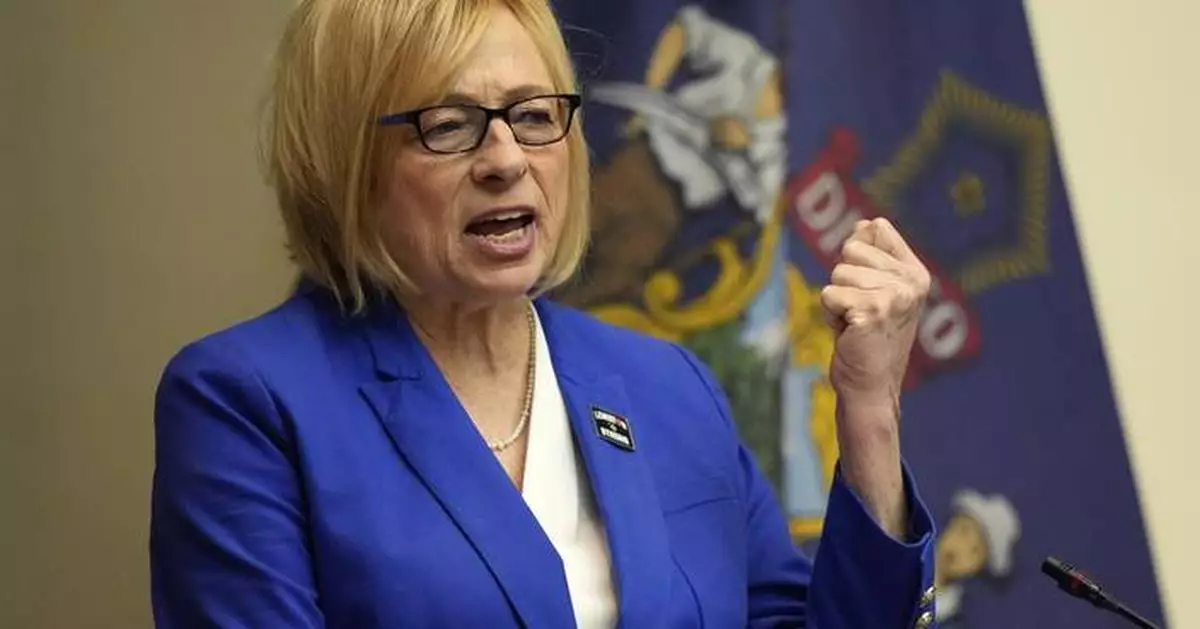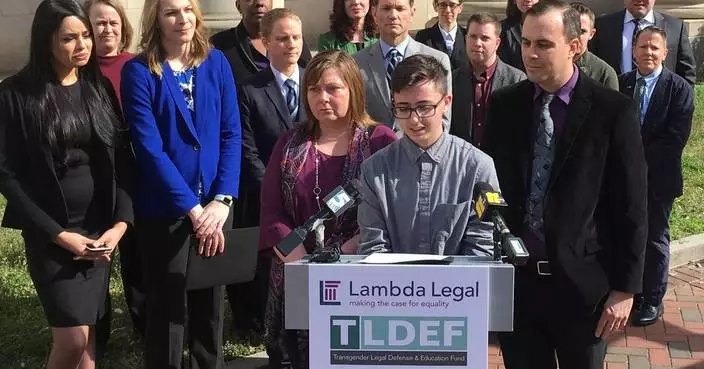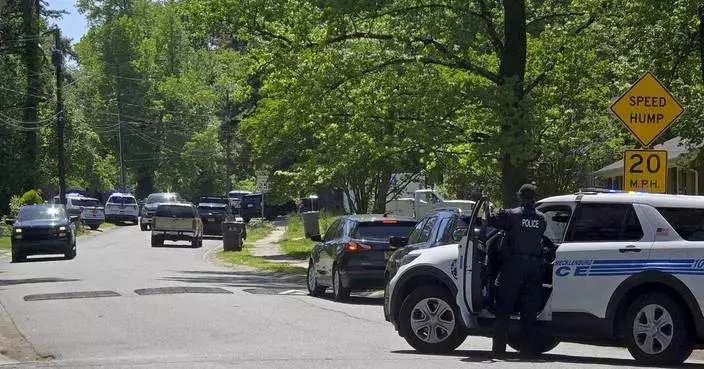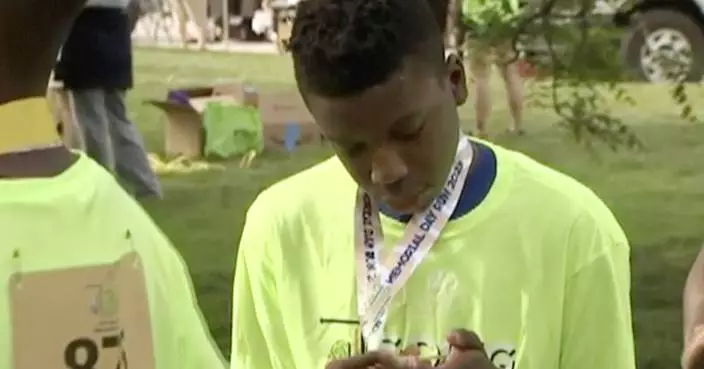PORTLAND, Maine (AP) — Maine will become the latest to join a multistate effort to elect the president by popular vote with the Democratic governor's announcement Monday that she's letting the proposal become law without her signature.
Under the proposed compact, each state would allocate all its electoral votes to whoever wins the national popular vote for president, regardless of how individual states voted in an election.
But the National Popular Vote Interstate Compact is on hold for now — and won’t play a role in the upcoming November election.
Gov. Janet Mills said she understands that there are different facets to the debate. Opponents point out that the role of small states like Maine could be diminished if the electoral college ends, while proponents point out that two of the last four presidents have been elected through the electoral college system despite losing the national popular vote.
Without a ranked voting system, Mills said she believes “the person who wins the most votes should become the president. To do otherwise seemingly runs counter to the democratic foundations of our country.”
“Still, recognizing that there is merit to both sides of the argument, and recognizing that this measure has been the subject of public discussion several times before in Maine, I would like this important nationwide debate to continue and so I will allow this bill to become law without my signature,” the governor said in a statement.
The compact would take effect only if supporters secure pledges of states with at least 270 electoral votes. Sixteen states and Washington, D.C. have joined the compact and Maine’s addition would bring the total to 209, the governor said. Other hurdles include questions of whether congressional approval is necessary to implement the compact.
In Maine, one of only two states to split their electoral votes under the current system, the debate in the Maine Legislature fell along partisan lines with Republican united in opposition.
Maine awards two of its four electoral votes to the statewide presidential winner along with one apiece for the winner of each congressional district. In 2016, the state split its electoral votes for the first time when Republican Donald Trump won a single electoral vote in the northern, conservative 2nd Congressional District. Trump collected an electoral vote again in his failed presidential bid in 2020.

FILE - Maine's Democratic Gov. Janet Mills delivers her State of the State address, Jan. 30, 2024, at the State House in Augusta, Maine. Maine will become the latest to join a multistate effort to elect the president by popular vote with the Democratic governor's announcement Monday, April 15, that she's letting the proposal become law without her signature. (AP Photo/Robert F. Bukaty, File)
PHOENIX (AP) — Prosecutors say they will not retry an Arizona rancher whose trial in the fatal shooting of a Mexican man on his property ended last week with a deadlocked jury.
The jurors in the case against George Alan Kelly were unable to reach a unanimous decision on a verdict after more than two days of deliberation. The judge declared a mistrial on April 22.
The 75-year-old Kelly had been on trial for nearly a month. The rancher was charged with second-degree murder in the Jan. 30, 2023, killing of 48-year-old Gabriel Cuen-Buitimea outside Nogales, Arizona, near the border with Mexico.
Cuen-Buitimea had lived just south of the border in Nogales, Mexico. He was in a group of men that Kelly encountered that day on his cattle ranch.
The trial coincided with a presidential election year that has drawn widespread interest in border security.
THIS IS A BREAKING NEWS UPDATE. AP’s earlier story follows below.
PHOENIX (AP) — Prosecutors are headed back to court Monday afternoon to announce whether they will retry an Arizona rancher after a jury deadlocked last week over whether or not to convict him in the shooting of a Mexican man on his property.
The jurors in the case against George Alan Kelly were unable to reach a unanimous decision on a verdict after more than two days of deliberation. Santa Cruz County Superior Court Judge Thomas Fink declared a mistrial on April 22.
After the mistrial, the Santa Cruz County Attorney’s Office has the option to retry Kelly — or to drop the case.
The 75-year-old Kelly had been on trial for nearly a month in Nogales, which is on the border with Mexico. The rancher had been charged with second-degree murder in the Jan. 30, 2023, killing of 48-year-old Gabriel Cuen-Buitimea outside Nogales, Arizona.
Cuen-Buitimea had lived just south of the border in Nogales, Mexico. He was in a group of men that Kelly encountered that day on his cattle ranch. His two adult daughters, along with Mexican consular officials, met with prosecutors last week to learn about the implications of a mistrial.
Prosecutors had said Kelly recklessly fired nine shots from an AK-47 rifle toward a group of men, including Cuen-Buitimea, about 100 yards (90 meters) away on his cattle ranch. Kelly has said he fired warning shots in the air, but argued he didn’t shoot directly at anyone.
The trial coincided with a presidential election year that has drawn widespread interest in border security. During the trial, court officials took jurors to Kelly’s ranch as well as a section of the U.S.-Mexico border.
Earlier, Kelly had rejected an agreement with prosecutors that would have reduced the charge to one count of negligent homicide if he pleaded guilty.
Kelly was also accused of aggravated assault of another person in the group of about eight people.

FILE - George Alan Kelly enters court for his preliminary hearing in Nogales Justice Court in Nogales, Ariz., Feb. 22, 2023. Prosecutors headed back to court Monday, April 29, 2024, to announce whether they will retry Kelly, an Arizona rancher, after a jury deadlocked in the fatal shooting of a Mexican man on his property near the southern U.S. border. Jurors in the case against Kelly did not reach a unanimous decision on a verdict and the judge declared a mistrial on April 22. (Mark Henle/The Arizona Republic via AP, Pool, File)











